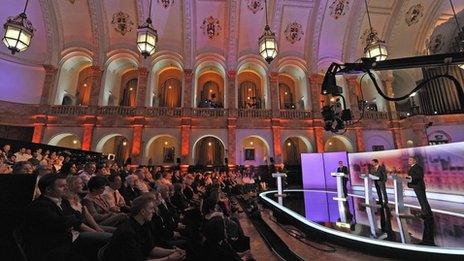General election debates cannot be 'taken for granted'
- Published

The three debates in 2010 had a total TV audience of 22 million
It cannot be "taken for granted" that leaders' debates will happen during the 2015 election, broadcasters have said.
Executives from the BBC, Sky and ITV told peers that the first-ever debates in 2010 had worked well and increased engagement among younger voters.
John Ryley, from Sky News, said the party leaders had agreed in principle to debates this time around and opinion polls suggested the public backed them.
But ITV's Michael Jermey said they could easily be "derailed".
And the BBC's chief political adviser, Ric Bailey, said the broadcasters had to work "very hard" to get the 2010 debates off the ground and it could not be "guaranteed" that they would be repeated.
He suggested they had worked last time because the three broadcasters had come forward with a "simple idea" and not proposed rival or different approaches.
Nick Clegg and Ed Miliband have said they want the debates to take place again next year.
David Cameron has said he supports the idea but has suggested that the format needs to be reviewed, with some of the debates taking place before the start of the campaign so as not to take attention away from it.
'Public interest'
In 2010, the BBC, ITV and Sky News each hosted their own debate during the five-week campaign, with questions on general issues and themed subject areas.
The then Labour Prime Minister Gordon Brown, Conservative leader David Cameron and Lib Dem leader Nick Clegg answered questions from members of studio audiences on home affairs, foreign policy and the economy.
Giving evidence to the Lords Communications Committee, the three broadcasting representatives said the debates had been a "great success" and were in the "public interest" in terms of stimulating public awareness and engagement.
Mr Jermey, ITV's director of news and current affairs, said the broadcasters were working closely together to ensure they could take place again.
But he pointed out that they had taken nearly 50 years to arrange and that there had also been a 16-year hiatus between the first US presidential debate in 1960 and the next one in 1976.
"There is absolutely no reason that the debates should not happen but there are plenty of things that could derail them," he said.
'Rowdy warning'
Asked about the format of future debates, Mr Ryley, the head of Sky News, said he would like to see more "free-form discussion", including the chance for audience members to respond to answers given by politicians.
Mr Jermey said more flexibility, with each debate potentially having a different style, would be "desirable" but not essential - and that the 2010 format should be starting point for discussions about their structure.
However, crossbencher Baroness Deech warned that audiences for political shows were getting "more rowdy" and that people could "seize the chance to get national attention".
Asked whether Nigel Farage could be included in the debate, as the UKIP leader has demanded, Mr Bailey said the three broadcasters would all be looking "at the same evidence" when considering the make-up of the debates and seeking to meet the "same goal of impartiality".
The decision would ultimately be a matter of editorial judgement, he added.
Mr Jermey said the decision would be made at a "timely moment" closer to the election, taking into account the party's performance at past elections and the broadcaster's public service obligations in relation to the Ofcom code.
Mr Ryley said Sky News would take the "final decision" on who would take part, based on the watchdog's guidance.
- Published6 January 2014